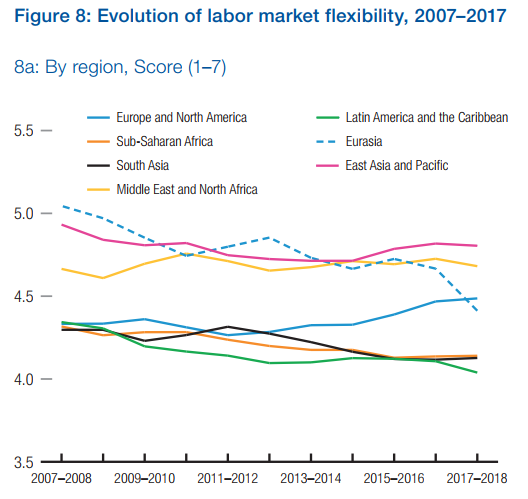Setting the right course for labour policy in today’s rapidly evolving world of work is a complex challenge. Trends such as skills imbalances, the gig economy and digitization are transforming work so quickly that policy creation is lagging behind

Countries that want to achieve sustainable growth must cater for diverse forms of work and consider the rights of all workers. Our policy-makers need social innovations to fully embrace the idea of flexibility and social protection – “flexicurity” – by giving all workers the same rights and benefits, regardless of what contract they have.
by
Alain Dehaze*
As a provider of workforce solutions, we seek to highlight the role a well-regulated labour market plays in a country’s competitiveness. At best, policy is about protecting the rights of all workers while also driving fair competition and enabling opportunity. It is about making the future work for everyone. At worst, policy tries to resist change and creates uneven playing fields that eventually hurt everyone.
Getting this balance right is more important now than ever. Many nations, businesses and workers are in danger of falling behind in the race for competitiveness and prosperity. But it need not be the case, if we act now to shape our labour markets into environments that work for everyone.
A fairer future
How to do this? First, we need to accept a few truths. Economic uncertainty is transforming the world of work. The open-ended employment contract and idea of "jobs for life" are being challenged. Roughly a third of workers in the United States and Europe are free agents. More than half of the workforce in Latin America, India and China does not have a formal contract. Already today, in many areas, flexible working is the norm, not the disruptive force.
Unfortunately, most policy frameworks around the world are ill-equipped for this new reality. They are based on old ways of working, and do little to encourage or facilitate the new world.
Because of outdated regulations, workers in different types of contract often have unequal access to healthcare, pensions, education and training, as well as other social benefits. This has to change for countries to remain competitive, and for our businesses and workers to survive in the digital age. It's often said that opportunity and reward await those who take this leap.
Based on 10 years’ worth of data, the World Economic Forum’s Global Competitiveness Report 2017-2018, published this month, makes a compelling argument for updating current policy. “Competitiveness is enhanced, not weakened, by combining degrees of flexibility within the labour force with adequate protection of workers’ rights,” write the authors.

Flexibility v security
You do not have to sacrifice social protection to make way for flexibility. And you do not have to sacrifice performance to accommodate both concepts.
Countries that want to achieve sustainable growth must cater for diverse forms of work and consider the rights of all workers. Our policy-makers need social innovations to fully embrace the idea of flexibility and social protection – “flexicurity” – by giving all workers the same rights and benefits, regardless of what contract they have.
This will create a level playing field for all workers, so that one type of work is not favoured by regulation and policy, and so that everyone feels empowered.
So what needs to be done? Firstly, we need new social safety nets for this new age. We can move towards this by linking social benefits to individuals, rather than companies. That way, workers can build up their own benefit payments, regardless of their form of work. Rights can even be bundled and scaled, and transferred between different types of contract or statuses.
Policy-makers should also update employment-protection legislation so that labour markets are more accessible to outsiders, in order to reduce frictional unemployment and improve the employability of all workers, something that is essential to their economic security.
The Global Competitiveness Report states: “With vast numbers of jobs set to be disrupted as a result of automation and robotization, creating conditions that can withstand economic shock and support workers through transition periods will be vital.”
The winners in tomorrow’s world will be the countries that make it easy, sustainable and attractive for people and companies to embrace different forms of work.
*Chief Executive Officer, The Adecco Group
**First published in www.weforum.org



